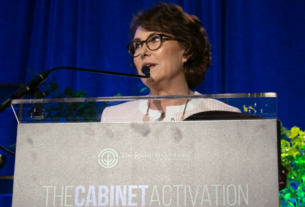(JTA) — Assembling abortion aftercare kits. A Havdalah ceremony combined with an update on state reproductive rights legislation. Sermons on abortion and Jewish law.
Those are some of the many ways more than 1500 synagogues and Jewish communities nationwide are observing the third annual “Repro Shabbat,” which begins tonight. It’s the first time the Shabbat initiative is happening since the Supreme Court overturned federal abortion protections in June.
The initiative, which is organized by the National Council of Jewish Women, is a local counterpart to the high-profile rally for reproductive rights the group held last May in Washington, D.C. Instead of a national action, NCJW’s aim this weekend is for local communities and people at home to engage with the issue more intimately.
“There’s a lot of things happening that are not big and flashy,” said Rabbi Danya Ruttenberg, the group’s scholar in residence. “If we have rabbis saying the word abortion from the [pulpit], if we have shuls being able to be spaces where people feel more comfortable telling their abortion story, and not feeling stigmatized, if we have people who understand deeply that abortion justice is a Jewish value, that’s already a huge culture shift.”
In the months since the Supreme Court decision, Jewish leaders have filed lawsuits challenging abortion restrictions in Kentucky, Florida, Indiana and Missouri on religious freedom grounds. Polls show that Jewish Americans, more than any other religious group, believe abortion should be legal in most or all cases.
Rabbis’ views on Jewish law and abortion differ. There is widespread consensus that Jewish law permits and even requires abortion in cases where the pregnant person’s life is at risk, and some non-Orthodox rabbis say that imperative includes risks to mental health. Some Orthodox groups, meanwhile, have argued that abortion should be permitted only in narrow circumstances.
As part of Repro Shabbat, students at the University of Nevada, Reno Hillel will be assembling abortion aftercare kits. In Massachusetts — where 28 organizations have signed up for Repro Shabbat — after a day of reproductive justice-themed educational programming, participants will gather online for a statewide Havdalah on Zoom.
NCJW has also created source sheets, a Spotify playlist and even a challah recipe with instructions to shape the braided dough into a uterus.
Following the Supreme Court’s decision, Ruttenberg said, “People understand that it’s not just an interesting and important thing to learn about. They understand that this matters in a different way.”




